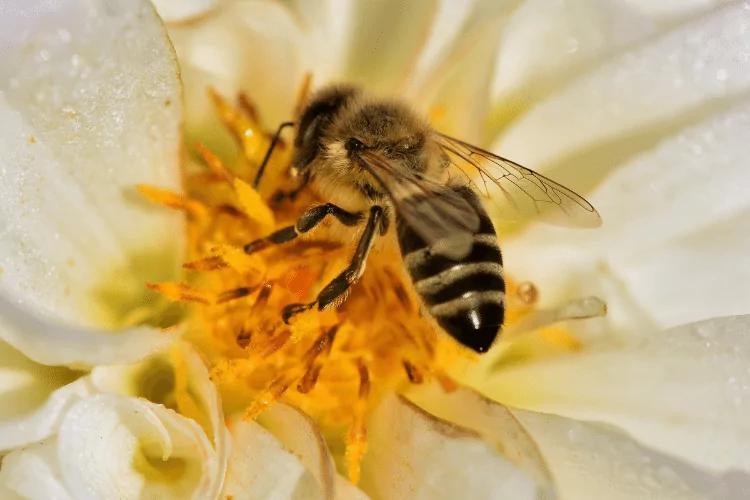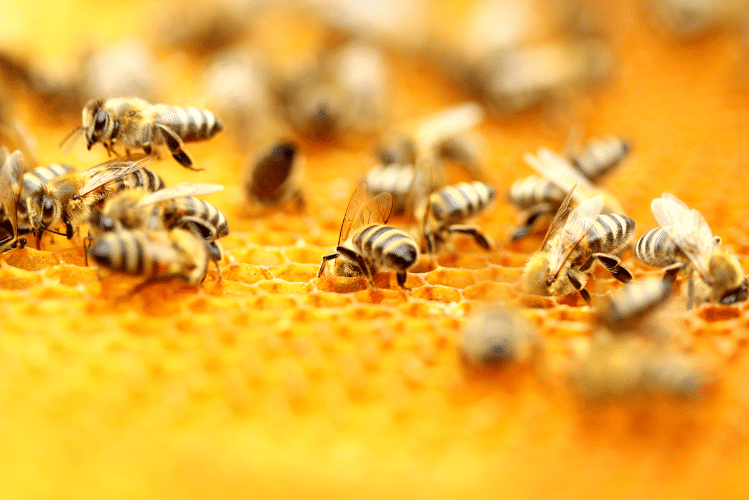Bees are some of the most fascinating creatures on the planet. They’re also some of the most important for the world’s ecological diversity. As many beekeepers can attest to, some bee species are more aggressive than others.
This may get you wondering: are Russian bees aggressive?
Russian bees are considered a moderately aggressive species. While they aren’t as aggressive as Africanized honey bees, they’re also not as docile as Carniolan and Caucasian honey bees. Those tending to a hive of Russian bees should move slowly and use a smoker to reduce the risk of swarming and stings.
Read on to learn more about the Russian bee’s level of aggression. We’ll discuss the species’ temperament in detail and compare it to other bee species.
Russian Bees: An Overview
Russian bees are a subspecies of Western honey bees. As a result, the former and the latter are quite similar in appearance. They both have the black and gold striped aesthetic that comes to mind when you think of honey bees.
Breeders like to work with Russian honey bees for several reasons. For starters, they produce large amounts of honey in a short time. Furthermore, this bee species is quite hardy and low-maintenance.
These bees, originating in the colder climates of the Primorsky Krai region in Southeastern Russia, are great at overwintering and highly resistant to pests and health issues.
The Temperament of Russian Bees
Russian bees aren’t known to be excessively aggressive, but they aren’t the most docile species either. Additionally, the level of aggression can vary between different strains within the Russian bee species.
Russian bees may aggressively swarm at times, but it isn’t a common occurrence.
Note that Russian honey bees tend to have a more aggressive nature when crossed with other species. In these cases, the resulting offspring’s behavior can be unpredictable.

However, you’re more likely to experience aggression from Russian bees in general if you don’t read their signals correctly.
Russian bee hives have guard bees. Their job is to protect the hive from potential thieves coming for the colony’s honey. The presence of these vigilant bees means that beekeepers need to be extra careful when inspecting the hive.
This involves avoiding sudden movements and using their smoker a lot to avoid getting stung.
Russian bees are also considered more aggressive than other species, such as Italian bees. Additionally, Carniolan and Caucasian bees are generally more docile than their Russian counterparts.
What Can Cause Aggression in Russian Bees?
Aggression in bees is almost always a form of defense. They resort to this behavior when they feel there’s a looming threat against the hive. For example, walking past a hive can aggravate the bees if your direction is obstructing their flight path.
It’s at these times that bees are most likely to get aggressive. In turn, you should always be aware of nearby bee hives and avoid walking too close to them so you don’t cause a disturbance and risk getting stung.
Aggression Against Parasites
Not only can Russian honey bees be aggressive toward beekeepers and passers-by, but they’re also highly aggressive against pests. The most common pests that plague this bee species are tracheal mites and varroa mites.
Compared to Italian bees, Russian bees are significantly more aggressive against these pests. As a result, they’ve developed a natural resistance against varroa mites in particular.
The Russian honey bee’s methods for combating varroa mites include grooming and changing their brood production.
Varroa Sensitive Grooming (VSG)
Varroa-sensitive grooming is an aggressive form of self-cleaning that Russian bees use to rid themselves of pesky varroa mites. It involves the bees biting at themselves to kill or severely injure these parasitic mites.
By doing so, Russian bees give themselves a better shot at overwintering without issues.
Brood Production
Varroa mites rely heavily on Russian bees’ brood production to thrive. As a result, these bees attempt to fight mites by reducing their brood production.
The effect of this is twofold. Firstly, it hinders varroa mites’ rate of reproduction. Additionally, it gives them fewer brood cells to hide within the hive.
Which Bee Species Is the Most Aggressive
The bee species considered to be the most aggressive is the Africanized honey bee.
These bees are extremely defensive of their hives and don’t need nearly as much of a provocation as Russian bees to swarm with all their might.

Conservationists have looked to put Russian bees’ aggression to use in their efforts to preserve the bee population in the United States. Aggressive bees are more likely to survive due to their ability to protect themselves from looming threats.
This has actually worked to some degree as the rate of decline of the bee population has slightly decreased.
Another species that’s highly aggressive is the carpenter bee. The females of these species are the ones that have the ability to sting. However, male carpenter bees are quite aggressive too. They linger around their nest and swarm insects, animals, or humans they view as a threat.
Stingless bees are known to be extremely aggressive as well. This may seem counterintuitive to their name, but these bees use methods other than stinging to deter predators and threats.
When they’re in defensive mode, stingless bees will attack in large swarms and buzz loudly to overwhelm the threat. They also penetrate openings in predators’ bodies and nest in their hair.
Conclusion
If you’re thinking of growing a bee colony but aren’t sure which species of bees to go for, there are many options to choose from. Russian bees are one of the most common species chosen by beekeepers due to their high rate of honey production.
The question you may be asking is: are Russian bees aggressive?
Russian bees are more aggressive than other species, such as Caucasian and Carniolan honey bees. However, they aren’t as aggressive as Africanized honey bees.
To ensure that you won’t get stung by Russian bees when handling them, make sure to move slowly around the hive and be more liberal than usual with your smoker. By doing so, you’ll reduce the likelihood of guard bees swarming at you to defend the hive.
- Does Bleach Kill Bees? - April 23, 2024
- How Do I Get Rid of Ants Without Harming Bees? - April 16, 2024
- Do Bug Zappers Kill Bees? Completely Explained - April 9, 2024
